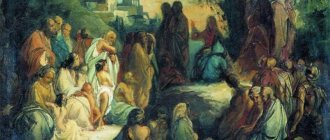Why is a person given an inquisitive mind?
Only a person with intelligence asks questions and seeks answers.
A wise person will find meaning in life, know why he was born, who God is, why he should believe in Him, fulfill the commandments, and fight sins. It is not difficult to make sure that the world was created by the Logos - this is an indisputable fact (you can verify it from personal experience), since opposing theories do not stand up to the criticism of believing pundits. The monkey won’t think; for some reason he doesn’t need it. We are given an inquisitive mind. By whom? Of course, by the One in whose Image the first man was created. We are the descendants and heirs not only of external similarity (we walk upright, have arms, legs, we speak), but also of spiritual, and even damage to the soul acquired by it. We are a “computer” whose memory contains not only progressive, but also “viral” programs.
Predecessors
Not only Christians, but also other philosophers thought about human vices and virtues. Thus, Aristotle's Nicomachean Ethics talks about several advantages or virtues. The philosopher believes that every positive property is a golden mean between two extreme states of the soul.
The Roman poet Horace also praised virtues and condemned vices. He wrote that the beginning of virtue is avoidance of vice.
Sins are talked about many times in the books of the Old Testament. Thus, Solomon wrote:
“These are six things that the Lord hates, even seven that are an abomination to His soul:
proud eyes, a lying tongue and hands that shed innocent blood,
a heart that forges evil plans, feet that quickly run to villainy,
a false witness who speaks lies and sows discord among brothers.”
(Prov.6:16-19)
The expression “six... even seven” may mean that Solomon is not giving a complete list of vices.
What did we inherit from Adam and Eve?
The fact that humanity has lost Paradise is not so bad. The worst thing is that instead of eternal life, where there was no suffering, no illness, no sorrow, no hunger, no cold, they acquired as an inheritance:
- mortality - sooner or later life will be taken away: from someone in infancy or even from the unborn;
- passion - anger, irritability, the need to eat, dress, conquer space, work hard at work, live indulging in suffering and sins;
- perishability - strength and youth melt away quickly, old age and illness, weakness - the result of our existence.
This is what we inherited from our forefathers. Can the lot of human life be called a victory or a triumph of reason, when for violating the only commandment: “Do not eat the fruit of the tree of the knowledge of good and evil,” you came to such a pitiful state? To return the lost Paradise, choosing the Christian path of life, you will inevitably come to the fight against sin.
About anger
Anger is not just outbursts of rage. Anger is a much broader concept. Of course, this emotion is the antithesis of love, but as a mortal sin, anger is not a momentary feeling at all.
A mortal sin is considered to be the destructive element that a person constantly spills out into life. That is, “destruction” becomes a synonym for the word “anger” in this case. The sin of wrath comes in many different forms. It is not at all necessary to start world wars. Mortal sin is manifested in daily domestic violence in families, both physical and psychological. Anger is what makes a child break his character and force him to realize his own dreams and ideas.
There are many examples of this sin around every person. Anger has become so firmly established in everyday life that almost no one notices it anymore.
Decalogue or 10 Commandments of God
And the question immediately arises: Why did God give Adam and Eve one commandment, and us 10? The answer lies in the fall of Cain, who killed Abel out of envy. Essentially being a proud man, he laid the foundation for the Cainite line. The Gospel of Mark lists the lineage of Christ down to the tribe of the first man. The clan of the Virgin Mary is also not Cainite. Ham became the successor of his works. Who are we to sort out? Who can tell now?
Over time, people completely “lost their edges.” They stopped distinguishing between what is good and what is bad. Remember the wild tribes. Eating your enemy was considered valor. Lying for profit is a wise trick. Rape is the norm. Worshiping idols is a vital need. Not to mention Sodom and other perversions. Man, destined to inherit the qualities of God, without knowledge of the Truth, is entangled in his own delusions.
Ten Commandments of God's Law:
- I am the Lord your God; Let you have no other gods before Me.
- You shall not make for yourself an idol or any likeness of anything that is in heaven above, or that is on the earth below, or that is in the water under the earth; do not worship them or serve them.
- Do not take the name of the Lord your God in vain.
- Remember the Sabbath day to keep it holy; Six days you shall work and do all your work, but the seventh day is the Sabbath of the Lord your God.
- Honor your father and your mother, so that your days on earth may be long.
- Dont kill.
- Don't commit adultery.
- Don't steal.
- Do not bear false witness against your neighbor.
- Thou shalt not covet thy neighbor's house; You shall not covet your neighbor’s wife, nor his male servant, nor his maidservant, nor his ox, nor his donkey, nor anything that is your neighbor’s.
The flood did not cleanse humanity of sinful depravity, which brings eternal torment, for long. How can we be saved so that we can regain the state lost by Adam? First, God gave 10 commandments to distinguish good from evil, truth from lies, goodness from destruction. Then He sent His Son, so that through repentance and union with Him (sanctification) they could get out of the trap into which they had driven themselves. Therefore, without Christ, nothing good shines for us, only eternal darkness and torment.
Note: Through the commandments, a person recognizes sin and sees that he is infected with it. If he wants to fulfill it, he will understand that he does not have such willpower. Only Christ conquers sin. It is necessary like air. The grace-filled union with Him occurs through the Sacraments of the Church.
Brief description of each and spiritual essence
Pride
It can also be positive. In this case, we simply rejoice in our successes. But sinful pride makes a person exalt himself above others and feel like a little god. For him, family members are servants, friends are his retinue.
At the same time, for someone who suffers from arrogance, it is not so important what others think about him. Even the opinion of the one true God does not matter to him.
“Know clearly that a person who proudly lives virtuously - if this means living virtuously at all - can unexpectedly fall into final destruction. Anyone who has allowed himself to fall, having learned humility from this fall, can rise up and quickly restore his former position, if only he wants.
The one who apparently does good with pride, but does not tolerate any evil, will never even notice his lawlessness, but, on the contrary, will only multiply the evil and suddenly leave here, deprived of everything.
Pride is the beginning of sin. Every sin begins with it and finds its support in it.”
John Chrysostom
Envy
Envy is the dissatisfaction felt by comparing one's achievements with those of others. An envious person constantly regrets his place in the world, believing that he will find joy only when he surpasses or humiliates others.
- Useful material for a practicing Christian:
What is the sin of envy and effective ways to combat it
Anger
Anger is not always condemned in Scripture. It was righteous anger that prompted Christ to drive the dishonest merchants out of the temple. Christians, following their Teacher, hate sin, but continue to love people who fall under its influence.
But sinful anger forces a person to take justice into his own hands and take revenge on the offender by any means. At the same time, a person indulges in anger over any little thing and over time loses the ability to control himself. It is like a sleeping volcano that can explode at any moment, destroying all life around it.
- Practical advice:
How to deal with angry thoughts and words
Dejection
Anyone can feel depressed. It is impossible to imagine a living and feeling person who would constantly rejoice at life in a world full of pain and disappointment. How can you experience happiness when faced with crime, incurable disease or the death of loved ones? But sinful despondency prompts a person to abandon God as a source of hope.
Fornication
This is a general name for all sins associated with sexual relations outside of marriage. This includes:
- adultery;
- intimate relationships before marriage;
- homosexuality;
- bestiality and so on.
Many have a completely wrong idea about fornication. It is believed that if a man and a woman live together in a so-called civil marriage, remaining faithful to each other, then this is not a sin. However, the Bible states that only those relationships that are formalized by law are considered marriage.
"The Seven Deadly Sins and the Four Last Things" Lust. Fragment of a painting by the Dutch artist Hieronymus Bosch, 1475-1480 Oil on board. 120 × 150 cm
Greed (love of money)
The love of money is a sin that makes a person a slave to money and wealth. But even when the cherished dream comes true and the desired wealth becomes a reality, the victim of greed does not thank God for his success and does not engage in charity. Just the opposite, a money lover becomes stingy and greedy. There is never enough for the greedy, even if he becomes the richest man on earth.
Gluttony
Food is a gift from a loving God. Sin is its excessive use or gluttony. The Apostle Paul considered this a manifestation of idolatry:
“Their end is destruction, their god is their belly, and their glory is in shame, they think about earthly things.”
(Phil. 3:19)
Gluttony includes several sins:
- abuse of wine and other alcoholic beverages;
- inabstinence from heavy food during fasting;
- constant spending of exorbitant amounts on delicacies;
- excessive consumption of sweets.
Particularly serious sins
These are the ones that destroy both the soul and the body. Or those about whom it is said that they cry out to God for vengeance. Accept them not as a dogmatic statement, but as an experience. It is difficult to wash away from such violations of God’s Law without incurring punishment in the form of suffering.
If the scoundrel prospers (enduring illness and sorrow cleanses the soul), then the Lord is still waiting and suffering, since the posthumous fate of such people is very terrible. They gain full measure, deserving hellish retribution. The most serious sins include:
- Killing or humiliating (bullying) parents.
- Fornication, adultery, corruption, seducing others.
- Withholding the worker's legal wages.
But through repentance, penance, and deeds that atone for guilt, everything can be corrected while a person is alive. As Zacchaeus did, he promised that he would reward those deceived four times more than he took.
About envy
Envy, like anger, should be understood more broadly than the desire to get a car like your neighbor's, or a dress better than your friend's. There is a rather thin line between envy and the desire to live no worse than other people.
Envy should not be understood as the desire to get something specific, for example, shoes like the boss’s, but the constant presence of the soul in such a state. The similarity between envy and anger is that both of these states are destructive. Only anger is directed at the world around us, other people suffer from its presence, and envy “looks” inside a person, its action harms the one who indulges in this sin.
What are passions and how to overcome them
In fact, the frequently encountered concept of “7 (8) deadly sins” is the main passions that enslaved a person. They are derivatives of all other sins. For example:
- Love of money: being thrifty and thrifty is normal. If, like Kashchei, you languish over gold, dream of wealth, envy, use unrighteous methods for excessive accumulation, excess, it means becoming a slave to passion. These include: disbelief in God, fear of old age, hard-heartedness towards the poor, greed, lack of mercy, theft, deception, etc.
- Gluttony is the mother of such sins: drunkenness, drug addiction, voluptuousness, gluttony, selfishness, intolerance, breaking fasts, etc.
- Despondency and depression are the plague of the modern world. In the United States, there are about 20 million people suffering from this disease. It ranks first, ahead of cardiovascular and oncological diseases. These include the following sins: neglect of duties, petrified insensitivity to matters of salvation, despair, driving oneself to suicide.
Major vices can be curbed if a person controls them. When he is unable to control himself, to say “no,” he is a slave to sin. You can have passions, but not act on them. This state is called dispassion; ascetics and saints of God strive for it. Saints achieve this, but none of them will say about themselves that they are sinless.
How to overcome passions?
It is wrong to believe that dispassion is the lot of monks and hermits. The commandments are given to all people. Whether they are in the world or have renounced it. To win, one must fight not only against sins, but against their derivative, that is, against the “parent”. Having defeated him, the “children” themselves will disappear. What weapon to use:
- Repentance.
- Participle.
- Fasting and prayer.
- Opposite virtues.
For example, non-covetousness, generosity, alms are opposite to the love of money. There is no clear distinction between passions. Having nurtured one, over time you will attract the other. Gluttony will give birth to fornication, fornication will lead to the love of money, etc. To get the fastest result, you need to start with the most outstanding, inherent in your nature.
Note: When you are rich in all 8 passions, the main evil is pride, vanity . They are opposed by love and humility . If you can acquire these virtues, consider that you have conquered sins and become saints.
Story
The concept of the seven deadly sins appeared among monks even before the Orthodox Church separated from the Catholic Church. In the 4th century. A monk from Byzantium, Evagrius of Pontus, created the doctrine of 8 sinful thoughts that give rise to other thoughts.
Who proposed this classification
The theory of seven sins leading to the death of the soul was developed by Gregory Dvoeslov in 590 AD. Later, other theologians studied it. The final concept was defined by Thomas Aquinas in the 13th century.
Another theologian who contributed to the development of this topic was Peter Binsfeld . He believed that every mortal sin has its own demon, which is responsible for its spread in the human world.








